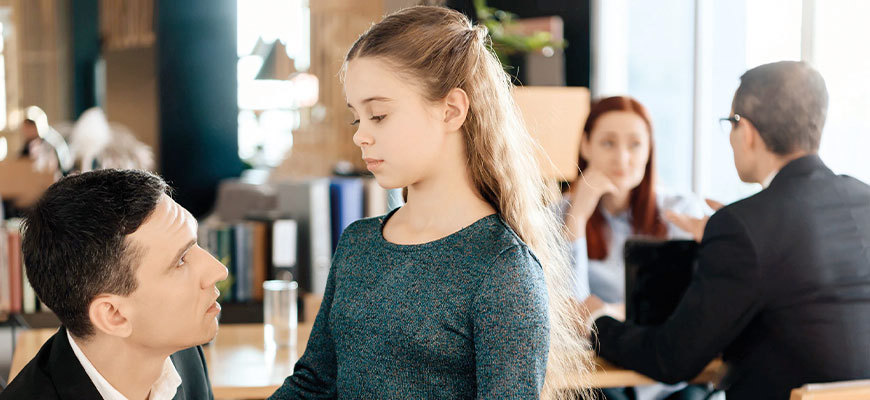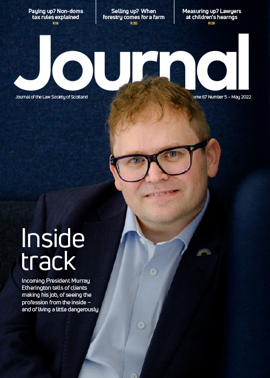Hearings for the child

I became head of Practice and Policy at Children’s Hearings Scotland (“CHS”) last autumn, and in that time I’ve come to really appreciate what goes into the role of a panel member. One of my key ambitions is to develop a more child friendly feedback and complaints process so that we can learn from the experience of all those who attend hearings, and work closely with all our key partners to improve the experience for children, young people and their families.
I have been struck by the scale of what we ask of panel members in terms of the complexity they face in hearings, as well as the need for empathy and their ability to communicate with children and families to encourage them to open up during a hearing. Then they have to evaluate and assess all the information before reaching a decision which they consider to be in the child’s best interests. It’s an incredibly important role, and in my view panel members make some of the most difficult decisions in public life in Scotland.
The children’s hearing system is part of Scotland’s legal and welfare system which combines welfare and justice for children and young people. Established following Lord Kilbrandon’s influential report, which specifically recommended an alternative to court based decision making for children and young people, a hearing is a legal tribunal, and the 2,500 panel members are volunteers who give up their time freely to help make high quality decisions for children and their families.
Children’s hearings are tribunals where children, families, professionals and panel members work together to identify what help children and young people need to reduce offending, protect them from harm and help them achieve their full potential. Panel members make legally binding decisions as to whether compulsory measures of supervision are needed to address risks to children and young people’s welfare and ensure their needs are properly met.
Selection and training
Panel members must be representative of the community they serve, and we recruit on that basis. Our volunteers have a wide range of backgrounds and experience which can add a richness and quality to hearings, while also creating the opportunity for much better insight into the issues facing children and young people who come before a hearing. We recruit every year through a rigorous process which ensures that we select the best candidates. Many panel members have lived experience and we make sure they are encouraged and supported to participate.
Panel members undergo an extensive period of training when they are recruited, culminating in a professional development award verified by the Scottish Qualifications Authority. The training focuses on dealing with the range of complex issues, such as childhood trauma, which they will encounter in hearings. The training ensures they have an appropriate knowledge of the law and procedure and best practice in children’s hearings. Successful panel members are appointed for a three year term, which can be renewed subject to their continued commitment to attend hearings and maintain appropriate skills and knowledge.
Those who are qualified to chair children’s hearings must also demonstrate that they possess sufficient knowledge of the legislation and practice to do so effectively. They must also demonstrate appropriate skills to manage hearings and involve all members in deliberations and decision making.
Child-focused approach
Hearings have to promote equal treatment for all, be fair and open, and ensure that decisions are taken in the best interests of the child. The approach is always child-centred and the ethos of the hearing should allow for that open and honest discussion, particularly making sure the child or young person is able to express their views to the panel, or have their views represented. Hearings should be collaborative and non-adversarial. It goes without saying that those involved in hearings must do everything possible not to cause additional stress or trauma to the child.
Hearings can be stressful for children and their families, and so the focus is very much on facilitating a conversation and listening to the opinions of everyone who attends. In that way, panel members can obtain the information they need to help them make the decision they believe to be in the best interests of the child, which must always be the central focus, even where that sometimes may not be what the child or their family wants.
COVID has brought real change to the system, with virtual and blended hearings becoming part of our daily lives now. This has resulted in some significant challenges in terms of the technology and indeed learning how to operate effectively in that environment. Our volunteer panel members have put in a herculean effort over the last two years to continue to support children and families, which is a real testament to the commitment in the community.
We continue to work with the Scottish Children’s Reporter Administration (SCRA) and children’s services to ensure that children remain properly safeguarded in the virtual hearings world. Virtual hearings are here to stay. They can improve access and provide additional options for participation for children, families and professionals, and anything that makes a hearing less stressful for a child is a good thing.
Role of the legal representative
The vast majority of legal representatives who attend hearings are excellent and they add real value to the proceedings. Panel members genuinely recognise and appreciate the contribution they can make to the experience for the child and family, particularly in offering good counsel and helping to manage their expectations.
On occasion, however, we see more combative approaches. While these may be appropriate in court, a children’s hearing must be a place where the ethos is far more about listening to the views of the child and others so the panel members can make high quality decisions.
Similarly, court based practices like cross-examination are not appropriate in the context of a hearing. While a legal representative may have genuine concerns about the content or opinion of other professionals, those are not matters to be fought out at a children’s hearing. That can be done outside the hearing setting if possible; otherwise the panel only needs to understand that there is a difference of opinion and what that is. It is possible to disagree within a hearing, but this should be done in a respectful way that honours the rights of the child and does not needlessly increase the stress levels for all those involved. The last thing anyone in a hearing wants is to traumatise a child, many of whom have already experienced multiple adverse childhood experiences.
In some cases, there may be a perception that because panel members are volunteers, they are less skilled than paid professionals attending hearings. This is seldom the case. Panel members undergo extensive training and are subject to quality assurance systems. There are many other examples of volunteers across Scotland that also provide an exemplary level of service – for example, mountain rescue volunteers. Few would say they are lacking in specialist skills, as they save the lives of hundreds of lost and injured hillwalkers every year.
Feedback welcome
CHS is committed to keeping The Promise to Scotland’s children to make the improvements identified in the Independent Care Review. At the heart of this commitment is a deep understanding of what matters to children and their families, listening to them, understanding the impact of trauma and poverty and doing everything possible to make the hearings a positive experience for all those involved.
While I’m relatively new to this post, one aim I’m really keen to achieve is to develop a more child friendly feedback and complaints process.
What we can learn from feedback and complaints has a real value for us as an organisation, because it can help to shape future policy development and feed directly into practice and learning for our panel community. We will be developing this work throughout the year. The Promise has set us a challenge to improve the hearing system, and that undoubtedly means change. We will continue to learn and adapt as we move forward. If I could make one ask of legal representatives in hearings, it would be to do everything possible to support the hearings system’s overall goal of reducing additional stress or trauma to the child. Please treat everyone with respect.
I would welcome your feedback on how we can continue to improve the hearing experience for all those involved.







